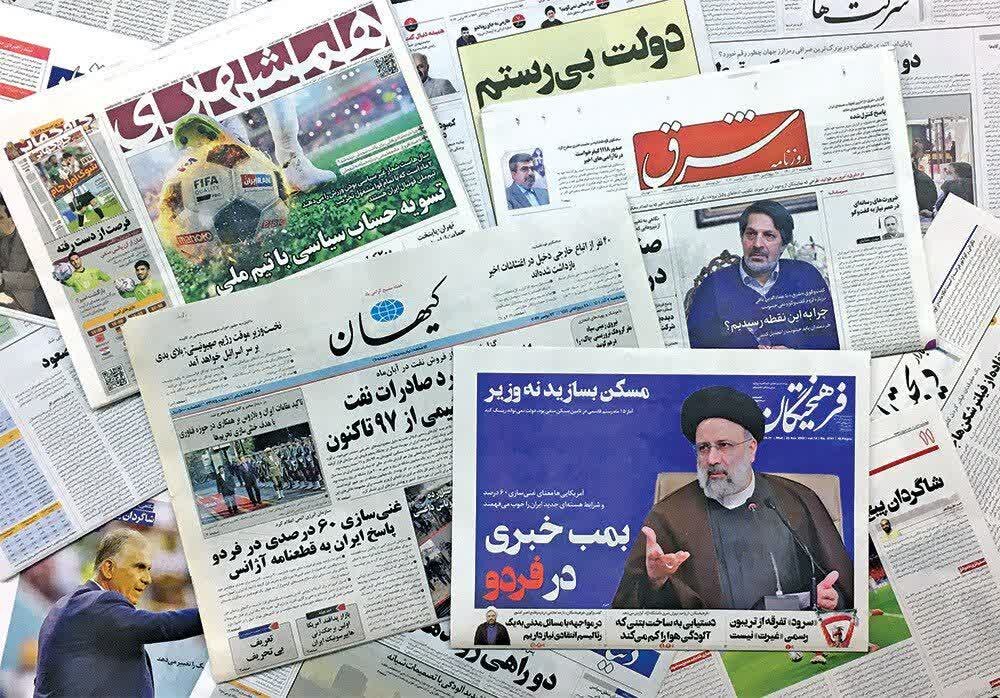Strike project failed

In a report, the Kayhan newspaper addressed the failure of the call for riot and strike in the weekend and wrote: "During the past two months, Western countries used all their political, economic and media power to trigger a strike in Iran, but their wish turned into a nightmare. The calls for strikes now have happened in European countries.
Thousands of workers and employees throughout Europe have stopped working in the recent days, tens of thousands have promised to stop working in the coming days and in the early days of the new year. The enemy's dreams turn into nightmares in different ways, their strategies and methods fail, they are disappointed. [Enemy’s] struggles for regime change, war, sedition, sanctions, terror, hybrid war and forced strike all fail.”
Iran: Tehran's upper hand in negotiations
The Iran newspaper in a report pointed to the possibility of EU sanctions against Iran under the pretext of human rights and drone claims. Iran wrote that "the White House politicians’ leading role in negative propaganda projects centered on Iranophobia, creating security-military confrontations, and showing fake power against Iran" has failed and stressed that "no doubt that if the current condition, the Islamic Republic has the upper hand in the negotiations. Iran also takes advantage of its long-term diplomacy in strengthening the regional policy and the development of the relationship with China and Russia as two members of the negotiating partners (to the Vienna talks intended to revive the JCPOA).”
Etemad: Don't brush off the reformists
Etemad, a reformist newspaper, held an interview with Taghi Azadarmaki, a reformist and academic figure, about the ongoing conditions in universities. In the interview, Azadarmaki says: "One way to radicalism is to ignore the reformist and benevolent people. Radical slogans are heard in the university because there is not will to negotiate with students; to talk to them and explain the conditions to them."
Vatan-e Emrooz: People's no response to rioters' call
The fundamentalist Vatan-e Emtrooz newspaper, in an article about the recent counterrevolutionary calls, wrote: "Once again, Iranians’ no response to the unrest was conspicuous. The movement of chaos, who had failed in its previous calls for a nationwide strike and closing businesses, had once more called for countrywide strikes from December 14 to 16, inviting people to shut down their businesses. But this call was not responded by people and the movement failed once again people did not pay attention to the calls and had their routine lifestyles.”
Farhikhtegan: Students criticizing the government
In a report, Farhikhtegan discussed President Raisi’s visit to the University of Tehran on Student Day [known as Azar 16 in the Persian calendar] and wrote: "Students’ podium has always been known for its openness and determination in front of the authorities. This openness and determination were seen this year on students' Day [7th Dec]. The students openly criticized the government and raised lots of questions about the lack of comprehensive awareness in the government, the condition of social media, family, and population challenges, wrong economic decisions, wrong appointments, and unfulfilled promises.”
Arman: Proposing the composition of the fact-finding committee
Arman, a pro-reform newspaper, wrote about finding a fact-finding committee about the recent unrest and quoted Rasul Montajabnia, a reformist figure as suggesting "two persons should be selected by the country's top authorities and two others be selected by the Leader of the Islamic Republic. Two fair and popular representatives should also be chosen by all representatives of the Majlis (Parliament). Two people should also represent the parents of the victims who were killed in the recent protests from both sides. Two senior judges elected by the country's Supreme Court should also be present in this committee. Two secretaries of legal parties, chosen by the house of parties, should also be present in this committee. Two lawyers from academic jurists selected by the law professors at Tehran University should also be present in this committee. One person from the country's armed forces should also be present in this committee."
Ham-Mihan: Dialog challenges
The reformist Ham-Mihan newspaper, in its editorial, wrote about the challenges facing domestic and political dialogues. “The recent comments by the head of the Judiciary about the people and events he has faced in these days are a sign of the difficulties he is facing in the current situation and that the radical and anti-dialogue forces, who have high power and influence, are not only among the opponents of the system and social media but also within the government.
Part of these oppositions and resistances is from the groups who do not tolerate the "other’s" views and "opposition" and think that the government is “the circle of insiders” and must keep distance from the others, opponents, and non-insiders to remain purer. Based on this view, sitting down with others and critics and opening dialogue with them is not a strategy for solving the problems to put an end to the recent unrest; rather, it is considered the cause of the country's problems. According to this belief, dialogue with others will weaken the ruling system. From this point of view, they disagree with interactions with the West, and with the forces which they call " the followers of the West inside the country". This is how they opposed the dialogue between civilizations in the 1370s (1990s) and also with the JCPOA in the 1390s (2015s). Today they do not allow dialogue with opposition forces and the others inside the country; even if they are from high profile people such as the head of the judiciary and the secretary of the Supreme National Security Council or the minister of interior.” "
